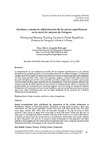Please use this identifier to cite or link to this item:
https://accedacris.ulpgc.es/jspui/handle/10553/52729
| DC Field | Value | Language |
|---|---|---|
| dc.contributor.author | Aragüés Estragés, Rosa María | en_US |
| dc.date.accessioned | 2019-02-04T11:34:04Z | - |
| dc.date.available | 2019-02-04T11:34:04Z | - |
| dc.date.issued | 2019 | en_US |
| dc.identifier.issn | 1133-598X | en_US |
| dc.identifier.uri | https://accedacris.ulpgc.es/handle/10553/52729 | - |
| dc.description.abstract | La importancia de los testimonios escritos de las mujeres republicanas en las cárceles franquistas ha quedado patente en las investigaciones de los últimos tiempos. Condenadas a largos años de reclusión su único consuelo era el escaso contacto epistolar intercambiado con sus seres queridos. Pero, cómo eran aquellas mujeres. ¿Tenían todas ellas la fortuna de poder dirigirse por escrito a sus familias? ¿Cuántas sabían leer y escribir? ¿Qué papel tuvieron otras reclusas como maestras de sus compañeras? El fin del siguiente artículo será conocer el grado de alfabetización de las reclusas, la implicación de centros y funcionarios penitenciarios en la formación de aquellas mujeres, así como tratar de recuperar algunos testimonios de las propias reclusas o sus familiares, que nos permitan acercarnos un poco más a sus vidas. Utilizando para ello los datos obtenidos de los archivos de la Prisión Habilitada de Predicadores. | en_US |
| dc.description.abstract | Recent investigations have established the importance of the written testimonies of Republican women in Francoist prisons. Sentenced to long years in prison, their only consolation was the scarce epistolary contact they had with their loved ones. But what were these women like? Were they all fortunate enough to be able to write to their relatives? How many of them were even able to read and write? What role did any of them play in teaching their fellow inmates? The aim of this article is to evaluate the literacy of female prisoners and the involvement of penitentiary institutions and prison officers in their education. We also try to uncover some testimonies of the prisoners and their families which might provide some further insight into their lives, using the archives of the Predicadores Prison in Zaragoza as the source for this data. | en_US |
| dc.language | spa | en_US |
| dc.relation.ispartof | Vegueta: Anuario de la Facultad de Geografía e Historia | en_US |
| dc.source | Vegueta: Anuario de la Facultad de Geografía e Historia [eISSN: 2341-1112], n. 19, p. 31-50 | en_US |
| dc.subject | 55 Historia | en_US |
| dc.subject.other | Mujer | en_US |
| dc.subject.other | Cárceles | en_US |
| dc.subject.other | Escritura | en_US |
| dc.subject.other | Cartas | en_US |
| dc.subject.other | Franquismo | en_US |
| dc.subject.other | Women | en_US |
| dc.subject.other | Prisons | en_US |
| dc.subject.other | Writing | en_US |
| dc.subject.other | Letters | en_US |
| dc.subject.other | Francoism | en_US |
| dc.title | Escritura y memoria: alfabetización de las presas republicanas en la cárcel de mujeres de Zaragoza | en_US |
| dc.title.alternative | Writing and Memory: Teaching Literacy to Female Republican Prisoners in Zaragoza’s Women’s Prison | en_US |
| dc.type | info:eu-repo/semantics/article | es |
| dc.type | Article | es |
| dc.identifier.eissn | 2341-1112 | - |
| dc.investigacion | Artes y Humanidades | en_US |
| dc.type2 | Artículo | en_US |
| dc.identifier.ulpgc | Sí | es |
| dc.description.esci | ESCI | |
| dc.description.fecytq | Q3 | |
| dc.description.fecytpuntuacion | 35,24 | |
| dc.description.dialnetimpact | 0,0 | |
| dc.description.dialnetq | Q2 | |
| dc.description.dialnetd | D3 | |
| dc.description.erihplus | ERIH PLUS | |
| item.grantfulltext | open | - |
| item.fulltext | Con texto completo | - |
| Appears in Collections: | Artículos | |
Page view(s)
59
checked on Jan 10, 2026
Download(s)
28
checked on Jan 10, 2026
Google ScholarTM
Check
Share
Export metadata
Items in accedaCRIS are protected by copyright, with all rights reserved, unless otherwise indicated.
